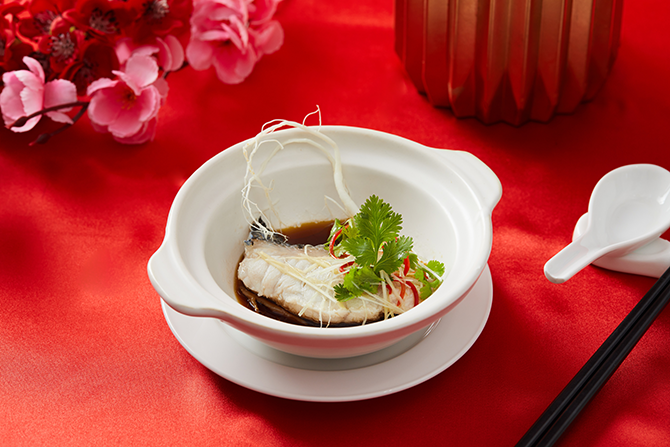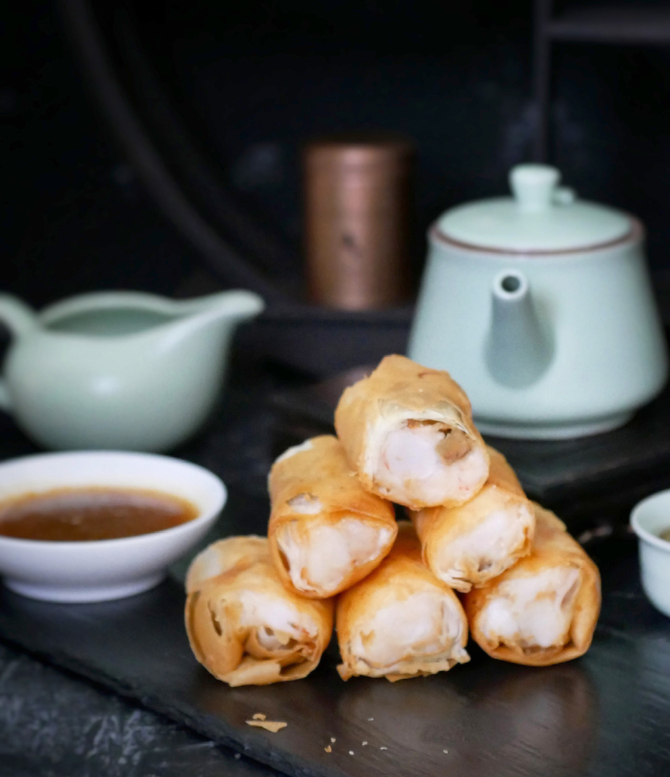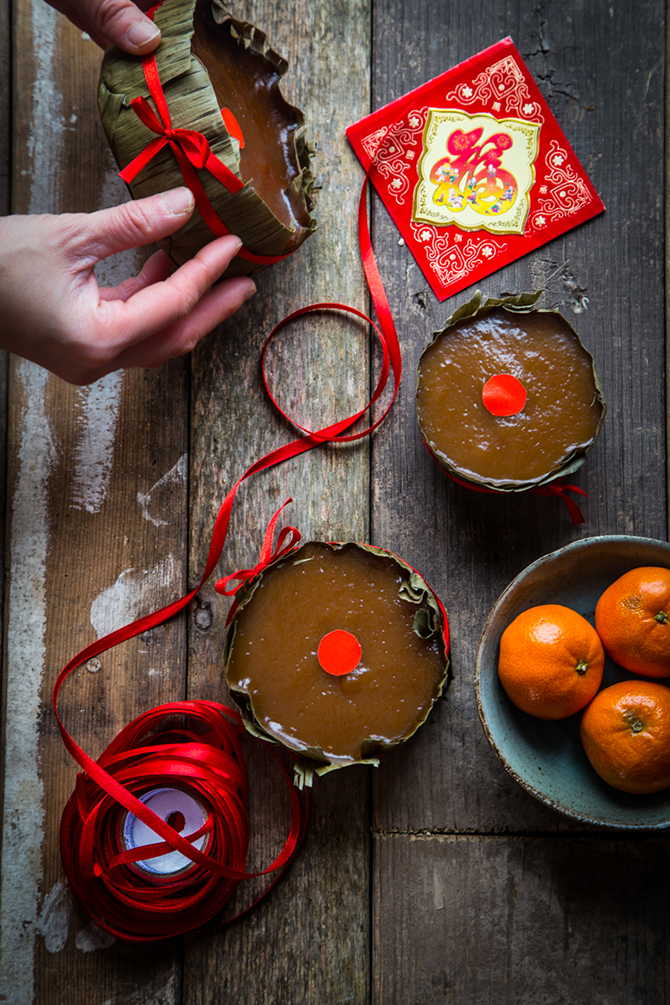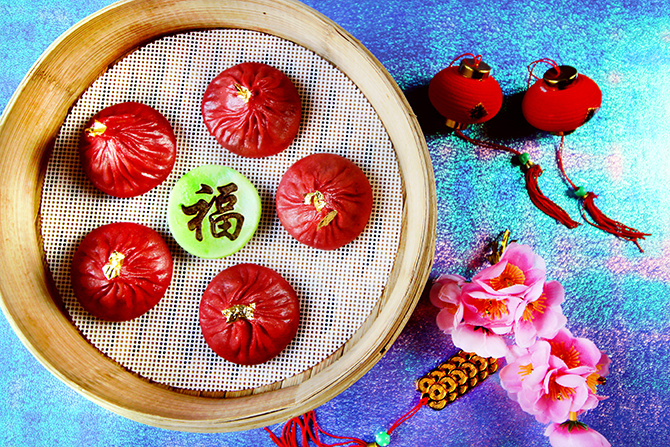Certain dishes are eaten during Chinese New Year for their symbolic significance. But why? Dating back at least 2,000 years ago, the symbolism of food in China comes from superstitions and traditional beliefs, as having a hearty meal typically evokes good blessings. It’s no wonder that serving or eating these auspicious foods will render luck and prosperity to your life.
Ahead are the best dishes to have in your Lunar New Year reunion dinner this year:
1. Fish—an increase in prosperity

Image: The St Regis KL
In Mandarin, the word for ‘fish’ 鱼 (yú) has the same pronunciation as the word, ‘surplus’ 余 (yú)—which signifies a growth in prosperity. Steamed fish remains one of the most famous dishes served during Chinese New Year, but what type of fish should we choose according to the lucky homophonic?
- Crucian carp: As the first character of ‘crucian carp’—鲫鱼 (jì yú) sounds like the Mandarin word 吉 (jí) which stands for luck. It is believed that eating crucian carp will bring good luck into the following year
- Chinese mud carp: The Mandarin word for ‘mud carp’—鲤鱼 (lǐ yú) is pronounced like the word for gifts, 礼 (lǐ). Hence, Chinese people think eating mud carp during New Year’s would be akin to wishing for good fortune
- Catfish: The Mandarin character for ‘catfish’—鲶鱼 (nián yú) is similar to 年余 (nián yú) which directly translates to ‘year surplus’. So if you’d like to wish for a surplus in the year ahead, you know what fish to prepare this year
These are some of the auspicious phrases that are related to fish:
- 年年有余 (nián nián yǒu yú) which translates to ‘may you always have more than you need’
- 鱼跃龙门 (yú yuè lóng mén) literally means ‘fish leaping over the dragon gate’. It implies that one will successfully pass a competitive examination.
Already looking for recipes to prep for CNY Eve? The St Regis KL is offering a dish—Hong Kong-style Steamed Giant Sea Grouper with Fresh Ginseng to help usher in a prosperous year for you and your family this Chinese New Year.
2. Yee Sang or Yú Sheng—a surge in abundance
View this post on Instagram
Yee Sang or Yú Sheng (Lou Hei in Cantonese) is a must-have during every Chinese New Year reunion dinner. The term Yú Sheng stands for ‘raw fish’ in Mandarin, which literally translates to the phrase ‘increased abundance’. The iconic dish comprises thin slices of pickled vegetables, raw fish and other ingredients mixed together thoroughly with a drizzle of special sweet sauce. It is prepared like a salad and is eaten after the ceremonial prosperity toss.
These are some of the phrases to say when tossing Yee Sang:
- 恭禧发财 (gōng xǐ fā cái): May you be rich and wealthy
- 龙马精神 (lóng mǎ jīng shén): May you have good health and vitality
- 生意兴隆 (shēng yi xīng lóng): May your business thrive and prosper
- 財源滾滾 (cái yuán gǔn gǔn): May wealth pour in endlessly
READ: Chinese New Year 2021: Yee Sang platters available for takeaway and delivery in KL
3. Spring Rolls—ushering in wealth

Image: Four Seasons Hotel Kuala Lumpur
In Mandarin, the word for spring rolls 春卷 (chūn juǎn) is derived from way back in China where it was traditionally eaten during the Spring Festival. Now, it is a popular Chinese New Year dish consumed not only within the country itself, but also in countries all over the world. The dish is filled with vegetables and small cuts of meat, wrapped in thin dough wrapper and finally deep fried. Once fried, the cylindrical-shaped rolls turn golden—making them look like gold bars, a symbol of wealth.
This is the auspicious phrase that’s related to spring rolls:
- 黄金万两 (huáng jīn wàn liǎng) which translates to ‘a ton of gold’. It is a wish for prosperity for those who consume it.
Keen on making spring rolls for your loved ones this CNY? Check out the Crispy Spring Roll with Shrimp in Four Seasons Hotel Kuala Lumpur’s festive menu.
4. ‘Nian gao’ or Glutinous Rice Cake—a higher income or position

Image: What to Cook Today
A popular Chinese New Year dessert is none other than glutinous rice cake 年糕 (nián gāo). It is considered a lucky charm to have this dessert on Lunar New Year’s eve. In Mandarin, this sweet treat’s pronunciation is similar to the word ‘年高’, which literally translates to ‘year-high’. The Chinese believe that eating it will help them figuratively climb up the ladder, be it in wealth or in their careers. The main ingredients consist of sticky rice, sugar, chestnuts, Chinese dates, and lotus leaves.
This is the auspicious phrase that’s related to nian gao:
- 年年高 (nián nián gāo) which translates to ‘getting higher, year by year’. This can also refer to one’s literal height, growth in success, better grades in studies, promotions at work, and more.
5. Dumplings—wealth

Image: W Hotel Kuala Lumpur
With a history of more than 1,800 years, dumplings 饺子 (jiǎo zi) is a classic auspicious food typically consumed during Chinese New Year. Its popularity transcends even to the West where baked sweet dumplings are a popular dessert in American cuisine. However, the Chinese put more emphasis on the symbolism of this dish—hence the shape that resembles Chinese silver ingots. Legend has it that the more dumplings you eat during the festive season, the more money you can make in the New Year.
However, each dumpling’s fillings represent different meanings. Chinese sauerkraut 酸菜 (suān cài) isn’t the most appropriate filling to be used as it implies ‘a poor and difficult future’. The common dumpling stuffing consists of cabbage and radish, which literally translates to ‘wishing for one’s aura to be as gentle as the wind’.
This is the auspicious phrase that’s related to dumplings:
- 招财进宝 (zhāo cái jìn bǎo) which translates to ‘bringing in wealth and treasure’. It is a felicitous wish for making money and amassing a fortune.
Dumpling darlings who are down to preparing these fortune-bearing foods for CNY, find out more about W Hotel’s Steamed Shanghai Fortune Dumplings here.
For more Chinese New Year guides, click here.
| SHARE THE STORY | |
| Explore More |




